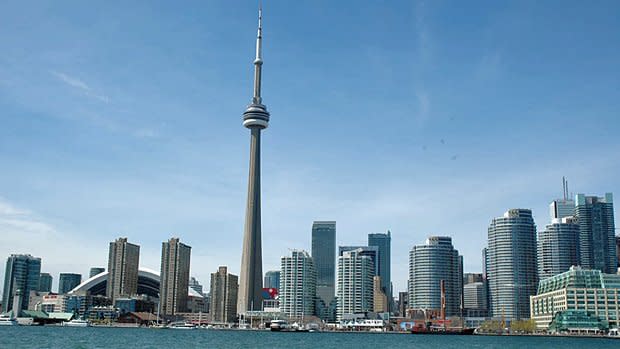Toronto’s economy at top, but for how long?

Toronto snagged the top spot as the city with the greatest economic momentum in Canada, but some big risks could undercut that status in 2013.
A housing boom, especially in the condo market, helped keep the country's most populous city ahead of other western powerhouses such as Vancouver and Calgary, said CIBC World Markets in a review of 25 Canadian cities.
As well, a recovery in the manufacturing sector, largely helped by an improvement in U.S. auto demand, was a key driver.
But those two key factors will likely be the biggest risks this year, said Benjamin Tal, deputy chief economist at CIBC.
"The question is sustainability," said Tal. "Those two engines will not be as strong. You might see the city losing its spot."
On the housing front, government measures to tighten mortgage rules this past summer have already cooled the once-hot real estate market, recent data has showed.
The winding down of many federal and provincial government infrastructure stimulus projects, may also slow the city's overall economic momentum this year, said Tal.
The city, which ranked top for the second year in a row, didn't lead in any of the key variables, but scored high enough in many categories to obtain the overall top ranking, said Tal, citing the "multi-channel" nature of the Toronto's economic engine.
Calgary ranked second in the analysis, up from ninth last year, reflecting strong population growth and a healthy labour market. Regina and Winnipeg also showed strong and more sustainable economic momentum.
CIBC's Metropolitan Economic Activity Index uses nine key macroeconomic variables including population and employment growth, and is structured in a way that approximates the change in each city's level of economic activity. The index monitors current performance of a given city, as well as its cyclical behaviour against the national economy and other census metropolitan areas.
CIBC Metropolitan Economic Activity Index (2012 Q3)
Rank | CMA | 3Q Moving Average |
1. | Toronto | 20.6 |
2. | Calgary | 19.5 |
3. | Regina | 18.4 |
4. | Winnipeg | 18.4 |
5. | Saskatoon | 18.2 |
6. | Edmonton | 17.8 |
7. | Ottawa | 16.8 |
8. | Vancouver | 14.0 |
9. | Halifax | 13.8 |
10. | Saguenay | 12.2 |
11. | Montréal | 11.2 |
12. | Québec City | 10.5 |
13. | London | 10.4 |
14. | Hamilton | 9.6 |
15. | Kitchener | 9.4 |
16. | Kingston | 9.1 |
17. | Trois-Rivières | 8.6 |
18. | Thunder Bay | 7.3 |
19. | Victoria | 6.8 |
20. | St. John's | 6.6 |
21. | St. Catharines-Niagara | 6.0 |
22. | Windsor | 4.0 |
23. | Saint John | -0.8 |
24. | Sherbrooke | -0.8 |
25. | Sudbury | -2.4 |

 Yahoo Finance
Yahoo Finance 